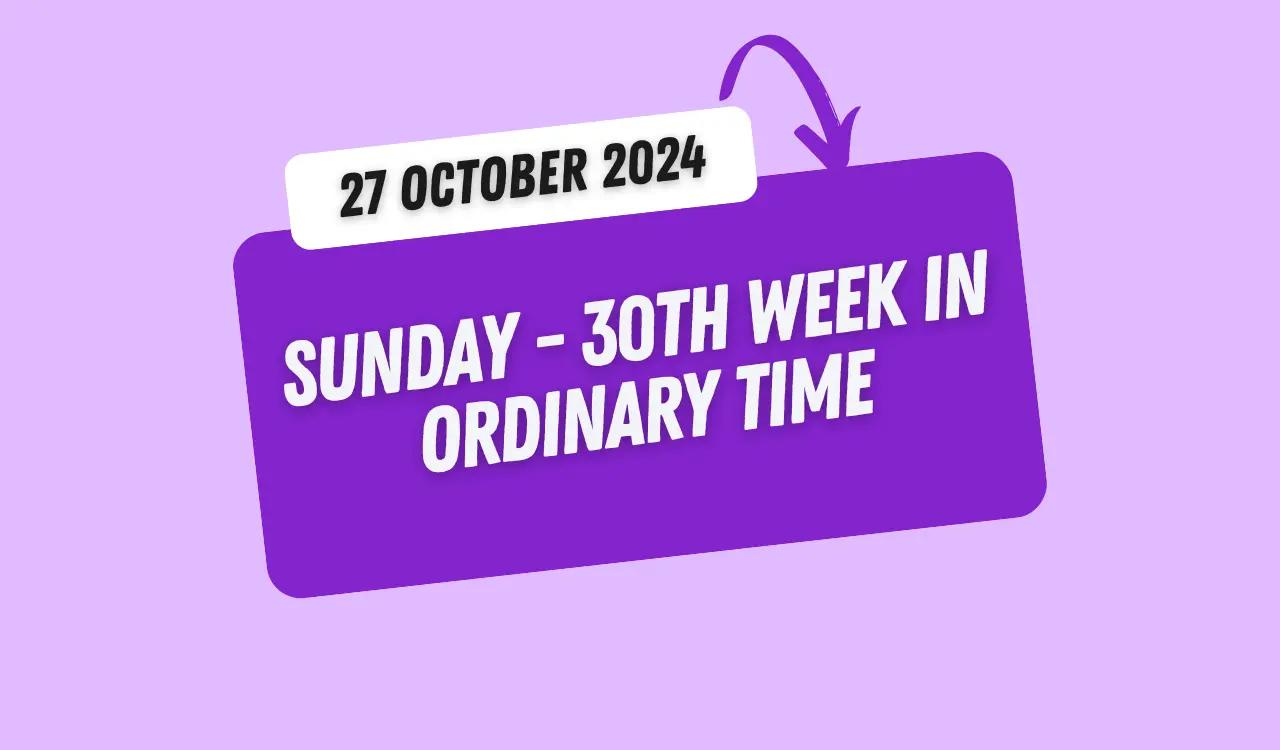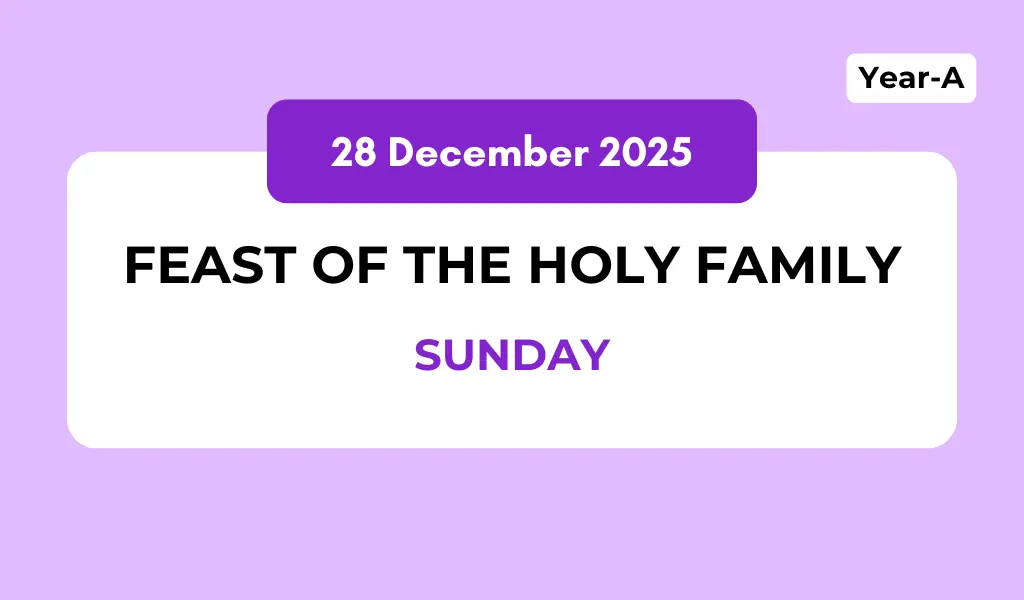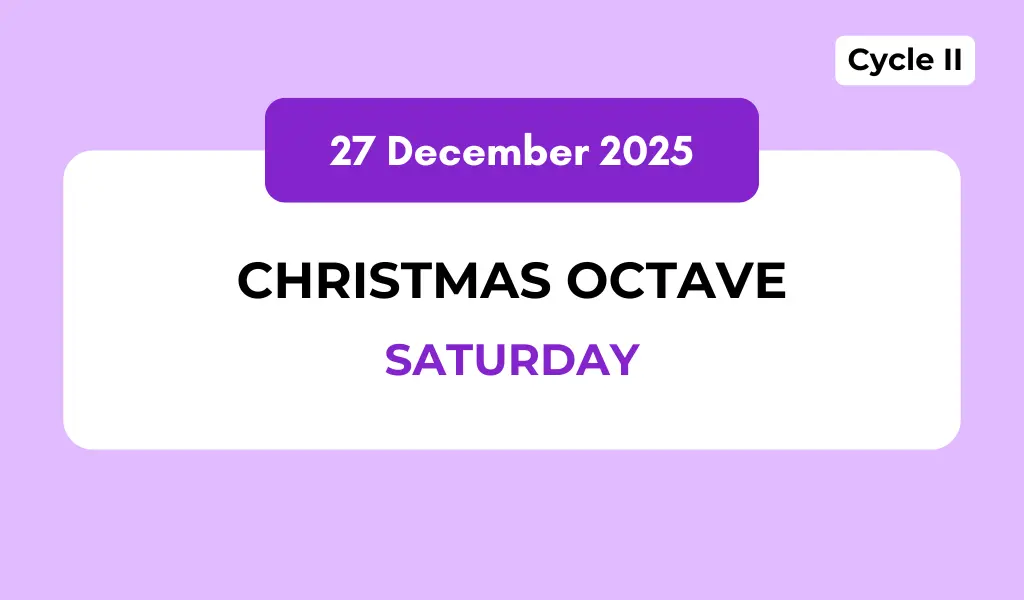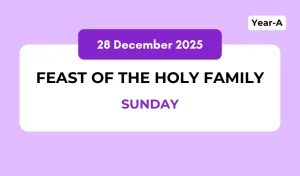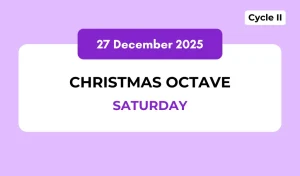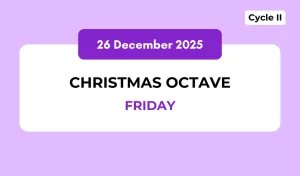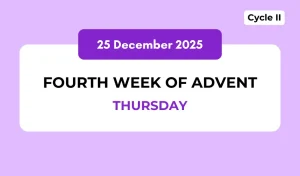Catholic Mass Readings and Reflection October 27, 2024
Thirtieth Week of Ordinary Time
27th October 2024 (Sunday)
Psalter: Week 2
Reading of the Day
First Reading: Jeremiah 31:7-9
Thus says the Lord: “Sing aloud with gladness for Jacob, and raise shouts for the chief of the nations; proclaim, give praise, and say, ‘O Lord, save your people, the remnant of Israel.’ Behold, I will bring them from the north country and gather them from the farthest parts of the earth, among them the blind and the lame, the pregnant woman and she who is in labour, together; a great company, they shall return here. With weeping they shall come, and with pleas for mercy I will lead them back, I will make them walk by brooks of water, in a straight path in which they shall not stumble, for I am a father to Israel, and Ephraim is my firstborn.
Psalm 126:1-2ab, 2cd-3, 4-5, 6 (R. see 3)
R/. What great deeds the Lord worked for us! Indeed, we were glad.
Second Reading: Hebrews 5:1-6
For every high priest chosen from among men is appointed to act on behalf of men in relation to God, to offer gifts and sacrifices for sins. He can deal gently with the ignorant and wayward, since he himself is beset with weakness. Because of this he is bound to offer sacrifice for his own sins just as he does for those of the people. And no one takes this honour for himself, but only when called by God, just as Aaron was. So also Christ did not exalt himself to be made a high priest, but was appointed by him who said to him, “You are my Son, today I have begotten you”; as he says also in another place, “You are a priest for ever, after the order of Melchizedek.”
Gospel Acclamation
V/. Alleluia
R/. Alleluia
V/. Our Saviour Christ Jesus abolished death and brought life and immortality to light through the gospel.
R/. Alleluia.
Gospel : Mark 10:46-52
At that time: As Jesus was leaving Jericho with his disciples and a great crowd, Bartimaeus, a blind beggar, the son of Timaeus, was sitting by the roadside. And when he heard that it was Jesus of Nazareth, he began to cry out and say, “Jesus, Son of David, have mercy on me!” And many rebuked him, telling him to be silent. But he cried out all the more, “Son of David, have mercy on me!” And Jesus stopped and said, “Call him.” And they called the blind man, saying to him, “Take heart. Get up; he is calling you.” And throwing off his cloak, he sprang up and came to Jesus. And Jesus said to him, “What do you want me to do for you?” And the blind man said to him, “Rabbi, let me recover my sight.” And Jesus said to him, “Go your way; your faith has made you well.” And immediately he recovered his sight and followed him on the way.
Daily Gospel Reflection
Sunday – Thirtieth Sunday of Ordinary Time
Guidelines: When we are weighed down by the burden of difficulties, let us not lose heart. Let us turn to Jesus. Let us trust in His compassion. Let us cry out to him. And we will surely experience his relieving intervention.
1. Today the Word of God invites us to focus on blindness. There is the healing of a blind man in the gospel. The scene is dramatic. There is a blind beggar. He cries out to Jesus to have mercy on him. The annoyed and irritated people chide him and try to quieten him. But he continues to shout aloud.
2. Jesus calls for him and asks him, “What do you want me to do for you?”. He replies, “Master, let me receive my sight”. Jesus says, “Go your way; your faith has made you well”. Immediately he received his sight.
3. Some simple details are notable. The blind man is a beggar. He is reduced to beggary. This shows the loss of human dignity and also his condition of dependence on others’ mercy.
4. Thus, blindness is not merely a matter of physical deformity. It is more pervasive affecting the whole person. And the blind man is aware of his need. He needs sight, not only the physical. He needs the ability to see his own lost dignity, lost beauty of life, and the lost joy of relationships.
5. He is clear about what he wants. Jesus too wants us to be clear of what we really want. That is why, Jesus asks him, “What do you want me to do for you?” And he rightly replies, “I want to see”. Sight is his priority and nothing else because he knows that with the regaining of sight, he will regain all that has been lost.
6. That is why he starts crying out aloud. He would persist despite people’s rebuke. He would catch the attention of the master. He was determined to stop the master’s mercy on the roadside. And when Jesus called for him, he was already sure of the Lord’s healing.
7. He would no longer need his mantle. He would no longer need to sit on the roadside. He would no longer need to beg. That is why, symbolizing the change to come, he throws off his mantle. He springs up from the ground. He hastens to Jesus. His faith wins the master’s favour!
8. At this point, we can note that this physical blindness is more symbolic. It indicates wider and more pervasive blindness. What Jesus heals is not merely physical blindness. His healing is a restoration of the holistic sight.
9. Sin causes different layers of blindness. Sin makes us blind toward God, toward others, toward our own self, toward life, toward society, and toward the whole creation.
10. The question of Jesus is very valid: “What do you want me to do for you?” The blind man knew what he lacked and what he needed. Do we know what we want? Do we realize what we lack? Do we realize that we are blind in very many ways and that we fail to see very many things?
11. How often we are blind toward God, failing to see His love, His will, His holy plans? How often we are blind toward others, failing to see them as our brothers and sisters, as our fellow travellers, who have their own good and also struggles?
12. How often we are blind toward our own self, failing to see us as we are, with our merits and demerits as well? How much do we fail to see our true image in the likeness of God, and also the false sheathes that are covering heavily this deeper image?
13. How much do we fail to see life as a blend of the pleasant and the unpleasant, good and bad? How often do we fail to see the true nature of life as transient on earth and destined toward eternity?
14. How much do we fail to see our duty toward society and also its role in our life? How often do we fail to see our moral obligations as social persons?
15. And how much do we also fail to see the whole creation as a handiwork of God and thus nurture a sense of steward and care toward it instead of manipulating and destroying it?
Practice: All of us are blind in different ways. We must realize and accept it in sincerity. We must in faith run to the Lord for sight. But once healed, we must walk the Lord’s way and not our own way. This is really to be in tune with the promise of God in Jeremiah 31. 8-9: I will make the blind and lame walk in a straight path in which they shall not stumble.
